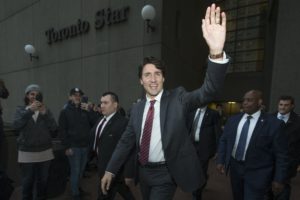
The Toronto Star’s expert columnists navigate the Canadian political landscape with a critical lens. Together they form a team that will provide readers with the depth and insight needed to better understand the issues, special interests and behind-the-scenes forces that drive national affairs and the impact they have on individual lives. Comprehensive coverage of the issues that affect all Canadians.
SAMPLE COLUMN
Trudeau betting on message of change to lock in victory
Chantal Hébert Toronto Star
MONTREAL-If the quest for change drives the vote on Oct. 19 then Justin Trudeau had a good debate on Thursday.
The Liberal leader fought hard – some would say over-aggressively – to cast himself as the real agent of change on the podium. And if that was his main objective, he achieved it.
Trudeau came to the debate on the economy determined to rock the boat and he brought with him platform oars designed to do just that.
Of the three leaders vying to serve as prime minister after Oct. 19, he alone is challenging the mantra of balanced federal budgets.
As NDP Leader Thomas Mulcair pointed out Thursday, that is a recent development.
As recently as two months ago, Trudeau was ruling out the possibility that a Liberal government would not balance its budgets. Since then, he has reversed himself to embrace the notion of running deficits for the bulk of a first majority mandate.
After Thursday’s debate, no one should doubt that he is comfortable with his latest position. Trudeau defended his intention to incur repeat deficits to spend more on Canada’s social and physical infrastructures with the passion of the newly converted.
He seemed even more comfortable with his plan to hit the country’s high-income earners with a tax hike, the better to redistribute the money to middle- and lower-income Canadians.
Neither of those commitments is universally popular – far from it – but they do distinguish the Liberal economic vision from that of Trudeau’s two main rivals and they do amount to a departure from the fiscal doctrine of the past decade.
By choice but also by necessity, Harper’s campaign is all about fighting change.
Absent the luxury of a fresh leader or, for that matter, a refreshed team to present voters, the Conservatives have little choice but to cast staying the course as the only responsible way to go.
Mulcair is striving to make more voters comfortable with his party’s economic credentials even if that involves – as it did on Thursday – giving up ground on the change front to Trudeau.
Whether that will serve the Liberals well between now and voting day is a different question. In the election deck, change is ultimately a wild card.
Some of that was in evidence in the post-debate assessments of the leaders’ performances.
There was a consensus that Harper and Mulcair had executed their respective strategies with competence but also questions as to whether that would be enough for either of them to break the current deadlock in voting intentions in their favour.
By comparison, political observers were all over the map on Trudeau’s performance. Some hated it. Others liked it. Many more were uncertain as to how it would play out.
Interestingly, the Quebec reviews were, on balance, more positive for Trudeau than in the other official language.
The province is home to some of the Liberal leader’s harshest media critics and his party ranks a distant third in Quebecers’ voting intentions. On Thursday, Trudeau may have benefited from lower-than-average expectations. One way or another though, the Liberals are not about to look a timely gift horse in the mouth.
If there is one region where the debate post-mortems probably mattered more than the event itself it is Quebec, where the audience for Thursday’s English-only debate was bound to be more limited than the national average.
If you found it hard to watch as the leaders talked over each other in English, imagine what it must have been like in simultaneous translation.
There has been little movement in voting intentions in Quebec since the election was called.
Poll after poll has found that a weak Bloc Québécois is strengthening the hand of the NDP at the expense of the Liberals and, at the rear of the pack, the Conservatives.
But the Quebec cement will not harden until after the first French-language debate of the campaign. It is set for Thursday on Radio-Canada.
It will be Gilles Duceppe’s first appearance on a debate podium in this campaign and his last best chance to talk voters into giving the Bloc Québécois another look.
If only because so many Quebecers did not expect the Liberal leader to still be standing seven weeks in the campaign, Trudeau, too, will have an opportunity to re-introduce himself to his home province.
-30-
COPYRIGHT 2016 BY TORSTAR SYNDICATION SERVICES
